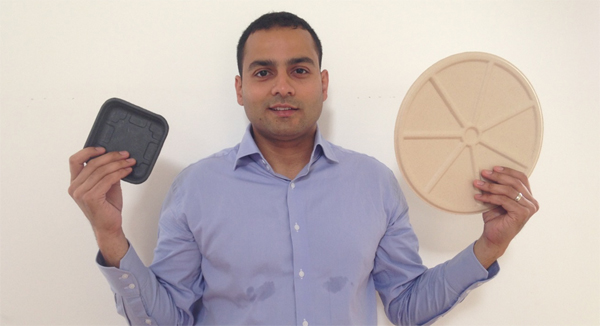Entrepreneur Inspired by Simpler Packaging Made from Natural, Recycled Sources
![]() Print this Article | Send to Colleague
Print this Article | Send to Colleague
This week’s entry in the NewsRoom Blog presented by the Drupa Exhibition, Düsseldorf, Germany, tells the story of Bloghen Jaydeep Korde who founded his company, Valueform, in 2003 as a research entity. He had already been thinking about his current business idea for decades at that time. Originally from India, his parents were disconcerted by the amount of environmentally unfriendly and over-engineered packaging they saw everywhere. "Why not make packaging out of natural materials", they wondered, like the food-wraps made of banana leaves that were common in India.
The first product they envisioned was a burger box made of banana tree bark. Even though the business eventually took some different routes, the idea of using low-cost, biodegradable material as packaging remained consistent in company strategy. Korde decided that cereal waste such as rice and wheat straw were some of the most affordable resources he could make use of. The materials, widely available, remain very cheap. And most importantly, by using waste, he doesn’t have to compete with food producers and biofuel refineries for raw materials, as the makers of corn-based bioplastics often do.
After his company’s launch, it took Korde eight years to develop a process that can turn any kind of cereal waste into packaging material. He engineered his technology to be compatible with existing machinery at pulp and paper mills. In defining the process, Korde took an interdisciplinary approach and worked with a host of technology partners, including the Danish Technology Institute, Reading University, Bangor University, the Bio-Composite Center, Co-op, BASF, and C-Tech.

Korde says this has greatly helped him define and develop new products: "It has been invaluable, taking a cross disciplinary approach means you can take ideas from a totally different field and see how they might be useful," He faced many challenges when trying to match the characteristics of traditional packaging. "The substrate is pretty flexible, but the chemistry required for each application is different, depending on waterproofing requirements, oven, and microwave requirements," Korde explains.
Though his goal in the past has been to work by himself supplying supermarkets and any company currently packaging high volumes of food in plastic or paper with packaging made from 100% straw waste that meets or beats current prices, Korde says he is now ready to license his technology.
According to Drupa, the food packaging market is expected to reach more than $70 billion in sales per year by 2017. Korde thinks his company, Valueform, is well positioned for solid growth with his business model. While food packaging is one important focus, Valueform is also supplying hospitals in the U.K. with disposable medical products made of straw or cereal waste. He says each new customer tends to teach him a new lesson: "We are learning about global logistics and the details around our customers’ businesses, as well as managing the enormous technical detail around the packaging we are replacing.


